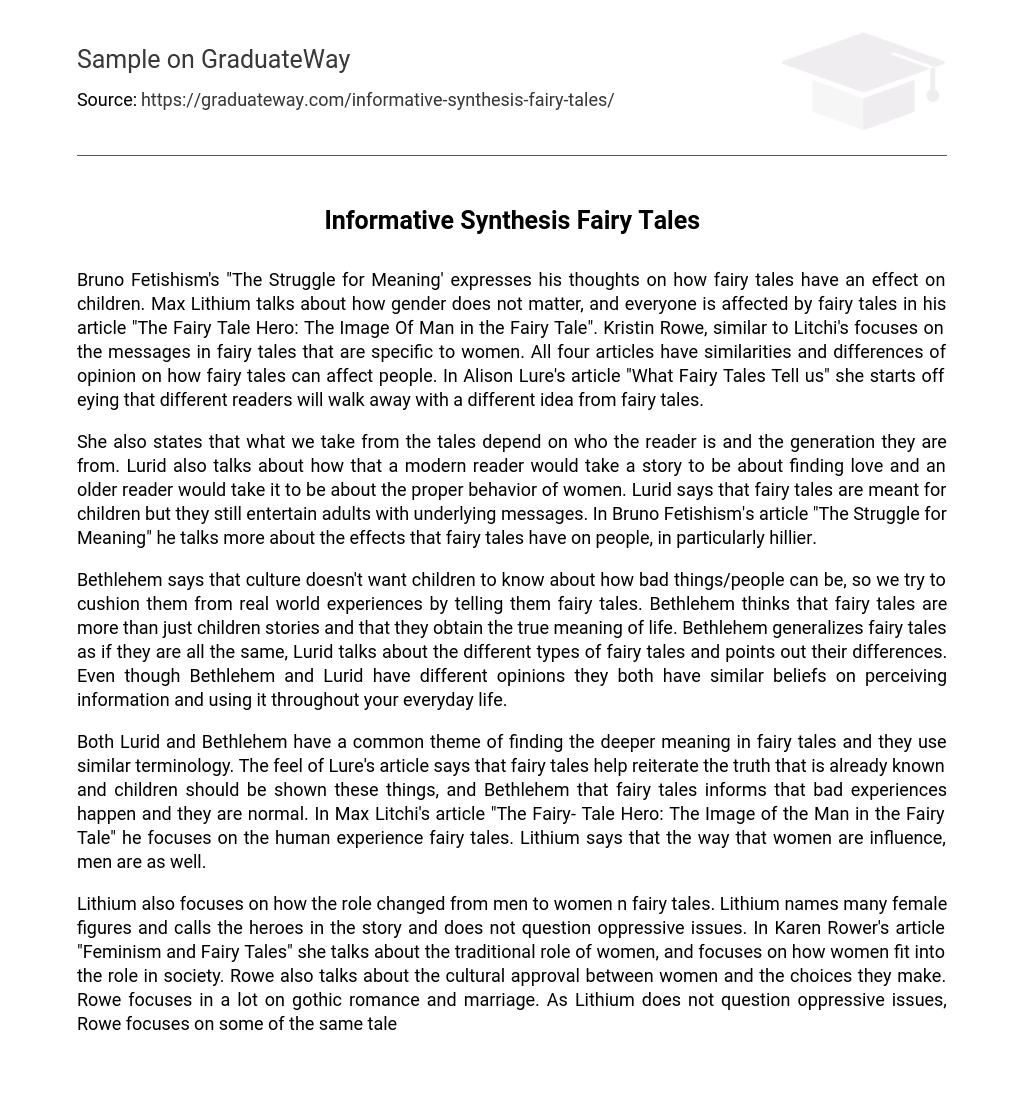Bruno Fetishism’s “The Struggle for Meaning’ expresses his thoughts on how fairy tales have an effect on children. Max Lithium talks about how gender does not matter, and everyone is affected by fairy tales in his article “The Fairy Tale Hero: The Image Of Man in the Fairy Tale”. Kristin Rowe, similar to Litchi’s focuses on the messages in fairy tales that are specific to women. All four articles have similarities and differences of opinion on how fairy tales can affect people. In Alison Lure’s article “What Fairy Tales Tell us” she starts off eying that different readers will walk away with a different idea from fairy tales.
She also states that what we take from the tales depend on who the reader is and the generation they are from. Lurid also talks about how that a modern reader would take a story to be about finding love and an older reader would take it to be about the proper behavior of women. Lurid says that fairy tales are meant for children but they still entertain adults with underlying messages. In Bruno Fetishism’s article “The Struggle for Meaning” he talks more about the effects that fairy tales have on people, in particularly hillier.
Bethlehem says that culture doesn’t want children to know about how bad things/people can be, so we try to cushion them from real world experiences by telling them fairy tales. Bethlehem thinks that fairy tales are more than just children stories and that they obtain the true meaning of life. Bethlehem generalizes fairy tales as if they are all the same, Lurid talks about the different types of fairy tales and points out their differences. Even though Bethlehem and Lurid have different opinions they both have similar beliefs on perceiving information and using it throughout your everyday life.
Both Lurid and Bethlehem have a common theme of finding the deeper meaning in fairy tales and they use similar terminology. The feel of Lure’s article says that fairy tales help reiterate the truth that is already known and children should be shown these things, and Bethlehem that fairy tales informs that bad experiences happen and they are normal. In Max Litchi’s article “The Fairy- Tale Hero: The Image of the Man in the Fairy Tale” he focuses on the human experience fairy tales. Lithium says that the way that women are influence, men are as well.
Lithium also focuses on how the role changed from men to women n fairy tales. Lithium names many female figures and calls the heroes in the story and does not question oppressive issues. In Karen Rower’s article “Feminism and Fairy Tales” she talks about the traditional role of women, and focuses on how women fit into the role in society. Rowe also talks about the cultural approval between women and the choices they make. Rowe focuses in a lot on gothic romance and marriage. As Lithium does not question oppressive issues, Rowe focuses on some of the same tales that Lithium names, but finds oppressive qualities to analyze.
Both articles discuss how fairy tales re no longer just for entertainment for children. Lithium and Rowe both acknowledge the gender roles In society, the culture roles, and they both talk about the identities of both women and men. Lithium and Rowe both focus on types of categories within fairy tales. For example, Rowe focuses on categories such as “erotic, ladies, and gothic”, and Lithium focuses on European fairy tales and local legends. Rowe focuses on the oppressive qualities that fairy tales can portray and on women’s experience in fairy tales, while Lithium focuses on the humane experience and uplifting qualities of fairy tales.
All four of the articles share both similarities and differences of opinion on how fairy tales can affect people. Each of the four authors has made very valid points about their beliefs from their point of view. They each go into deeper evaluation to the points that fairy tales have a much deeper meaning that what everyone thinks, and how people are affected by them. Each author realizes the impact a fairy tale can have on a person. Anyone who should ever argue against fairy tales having a deeper meaning should read these four articles. Works Cited Bethlehem, Bruno. “The Struggle for Meaning.





